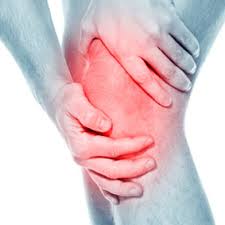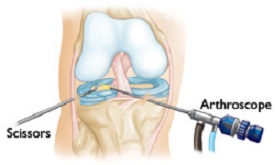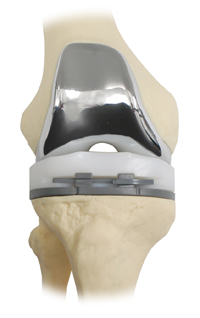Arthritis
Arthritis literally means inflammation of a joint. It is more commonly known as wearing out of our joints. When arthritis occurs, cartilage (which is the material that covers the ends of the bones) begins to wear leading to inflammation and pain.
When enough cartilage wears off then bone will be exposed and lead to persistent pain and disability. There are many different types of arthritis.
These can include Osteoarthritis and inflammatory types such as gout and rheumatoid arthritis. In these types the joints are inflamed because of crystals or the body attacking its own tissues. Osteoarthritis is the “wear and tear” arthritis and is the most common type. This is the arthritis that usually affects older individuals and is most commonly seen in the hands, knees and hips.

X-ray showing arthritis of the right knee with loss of cartilage and bone on bone contact.
Arthritis Signs and Symptoms
Most people with arthritis have one or more of the signs and symptoms listed below. When these symptoms are severe enough patients will find themselves limiting their activities and changing their lifestyles.
Pain in and around the joints
Swelling in and around the joints
Stiffness after prolonged sitting and in the morning
Pain with weather changes
Limp
Pain in the back of the knee (Baker’s Cyst)

It is usually at this point when patients seek medical attention for their condition. There are many effective treatments available. Patients who suffer with this disease should seek medical treatment to discuss their options.
Once arthritis sets in there is no way to reverse the damage that is done. Treatment can range from things as simple as exercise to as involved as injections and medications.
Most patients are given an overall program that includes a variety of treatment options. The goals of treatment are therefore to decrease the patient's discomfort, increase the patient's function, and to hopefully protect the joints from further damage. Our doctors believe that a crucial part of the treatment plan is to educate the patient regarding their condition so that they may be an integral part of the treatment plan.
![]() Activit
Activit
> Weight loss
Most patients don’t understand that we can apply 6-8 times our body weight across our hips and knees with most every day activities. Therefore weight reduction is a crucial part of treating the pain and disability associated with arthritis.
> Activity modifications
Avoiding high impact activities such as running, jumping and excessive climbing can significantly decrease the symptoms of arthritis.
> Assistive devices such as cane or walker
Using a cane in the opposite hand can help decrease the load across the opposite hip by as much as 50 %.
![]() Medications
Medications
There are many medications available for the treatment of arthritis. Some of these are effective and others are nothing more than a gimmick. Unfortunately there are no medications which have been proven to reverse the disease.
> Anti-Inflammatory Medications
These include Ibuprofen, Naproxen, Celebrex, and others.
These medications work by decreasing the inflammation associated with arthritis. If effective, these medications can significantly decrease the pain associated with this disease. Unfortunately these medications have some serious side effects and patients should consult with their doctor before taking them.
> Health Foods
These are “foods” that are available over the counter and without prescription.
BEWARE:
Because these substances are classified as foods they are not regulated by the FDA and usually make unfounded claims of curing arthritis. To date there are no medications which have been proven to regenerate a substantial amount of cartilage or reverse the damage caused by arthritis.
Compounds that have been shown to decrease pain and possibly protect our joints include Glucosamine Glycan and Chondroitin Sulfate.
 Injections
Injections
There are two types of injections which are routinely used.
> Cortisone (more info)
Cortisone helps to decrease the inflammation associated with arthritis. This is usually injected directly into the joint and can provide many weeks of pain relief. This is not a permanent fix for the disease. Cortisone is used to temporarily relief one’s symptoms. There are some side effects to these injections so make sure you discuss this with your doctor.
> Hyaluronic Acid (Commonly known as chicken injections)
Chicken Shots? Rooster comb injections is the description commonly used to describe the use of artificial synovial fluid injected into the joint to ease the pain and stiffness of arthritis.
The modern injections are all manufactured in a lab controlled biochemical process but the original versions were extracted from the combs of roosters and the name has stuck.
These are injections which are given into the knee once a week over three to five weeks. Hyaluronic acid is normally found in our joints and serves as a lubricant. This substance is available for injection and is showing promising results. Again this is a temporary treatment that may provide up to 6 months of pain relief.
Surgery
When the pain and other symptoms can no longer be managed by non-operative methods then surgery is your best option. The belief that one needs to be completely disabled before considering joint replacement is not only false but dangerous. Studies have shown that patients that wait too long to have their joints replaced can have a harder recovery and poorer outcomes.
Arthroscopic Surgery

This procedure involves making 2-3 poke holes into the joint and removing torn cartilage or loose material from the joint. Although this procedure was commonly used in the past to treat arthritis, there are limited indications at this time for using arthroscopy in the knee. The main reason that its used less often is that is has not shown to provide any long lasting relief for moderate to severe arthritis. Its commonly used for treating cartilage tears.
Joint Replacement
Joint replacement can relieve the pain and disability of arthritis. Most patient can return to full function.
Click on the images below to learn more about joint replacement.

Hip Replacement
Hip replacement surgery (THA) has proven to be one of the most successful operations in medicine.THA surgery can help relieve pain, increase mobility and improve a patient’s quality of life.

Knee Replacement
Knee replacement (TKA) is a surgical procedure that replaces a damaged knee joint, usually a result of arthritis, with an implant. The dedicated physicians at Orthopedic Specialists of Oakland County are experts in caring for patients with knee pain.




